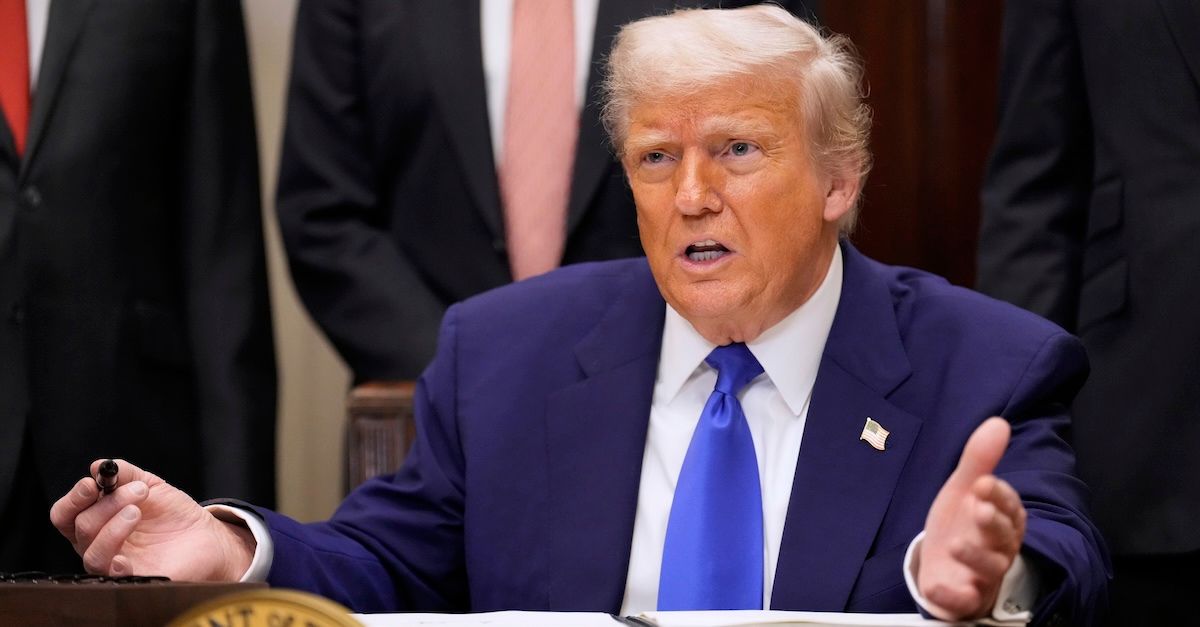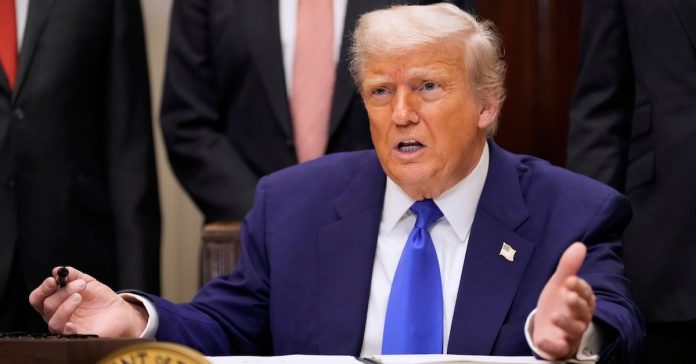
President Donald Trump speaks while signing an executive order related to drug prices, in the Roosevelt Room of the White House in Washington, Monday, May 12, 2025, in Washington (AP Photo/Mark Schiefelbein).
An attorney with the Department of Justice faced a highly skeptical judge in Manhattan on Wednesday while defending President Donald Trump‘s new regime of international tariffs.
Arguing before a three-judge panel on the U.S. Court of International Trade, DOJ lawyer Brett Shumate repeatedly saw his arguments run up against a judicial wall in the form of Senior Judge Jane A. Restani, who was appointed to the Big Apple-based court by Ronald Reagan.
During the hearing, the specialized court, empowered to hear all national and some international civil disputes over trade-related matters, considered a motion for a preliminary injunction filed by Oregon, which aims to put the kibosh on Trump’s “illegal tariffs.”
The government lawyer had a particularly hard time with various arguments before Restani, while the other judges also asked exacting questions of both sides, according to courtroom reports by the Capital Press, the Globe and Mail, and the Reuters wire service.
At one point during the hearing, the DOJ lawyer offered a public policy defense of Trump’s tariffs.
“The purpose of these tariffs is to create pressure,” he said, “Tariffs right now are giving the president the leverage he needs.”
The judge rubbished this line of thought as immaterial, focusing instead on fundamental statutory interpretation.
“It may be a very dandy plan, but it has to meet the statute,” Restani said.
The key statute at issue is the International Emergency Economic Powers Act (IEEPA), which the Trump administration has cited in various tariff declarations and legal filings.
As Law&Crime previously reported, the IEEPA grants the executive sweeping authority to quickly combat international economic crises and permits the executive to order sanctions as a rapid response to international emergencies.
In their 38-page complaint, the 12-state coalition led by Oregon Attorney General Dan Rayfield insists Trump “has no authority to arbitrarily impose tariffs as he has done here.” Specifically, the Democratic Party-led states allege the tariffs exceed “what is necessary ‘to deal with’ the purported emergency.”
For his part, Shumate essayed an understanding of the IEEPA, where the traditional review function of the courts is nonexistent.
This idea did not sit well with Restani.
“Nothing is so crazy or unrelated that it could be stopped by the courts,” the judge said, channeling the argument in a negative fashion. “Anything is allowed — anything crazy, any declaration of emergency based on some crazy thing, any remedy, how crazy as it could be — it’s all okay because the courts can’t do anything.”
The government attorney insisted, however, that Congress alone has oversight of the president’s IEEPA.
“At the end of the day, Congress can review,” Shumate said. “Congress can put pressure on the President.”
But the judge was not convinced by the likelihood of the legislative branch taking the rare step of upbraiding and cabining the executive.
“By two-thirds majority in each house of Congress, it can decide that this is too crazy,” Restani said.
Shumate was adamant that legislators had an arsenal of checks and balances if they wanted to take action.
“Congress could repeal IEEPA,” the DOJ attorney said. “Congress could take any number of measures — could not confirm the president’s nominees. At the end of the day, that’s the system that our framers set up.”
During part of the back-and-forth, Shumate sought to elucidate the reach of the president’s tariff powers under the IEEPA.
“The president could say, ‘No more imports from China, Mexico, Canada, period,”” the government lawyer said. “If the president has that authority, he certainly has the lesser authority.”
The IEEPA has relevant language, Shumate noted, which empowers the president to “investigate, regulate, or prohibit … any transactions in foreign exchange.”
Restani pressed the DOJ attorney to provide a presidential action that would fall outside of that seemingly broad remit.
To which Shumate replied: “It is hard for me to imagine what that would be.”
But the government was not the only side subject to scrutiny on Wednesday.
Judge Gary Katzmann, a Barack Obama appointee, asked the attorney representing the states whether the court “should be a backseat driver to the president” on foreign policy issues.
Brian Marshall, who works for the Oregon Department of Justice, said the president’s exercise of his IEEPA powers must be “reasonable” in an emergency, while insisting Trump’s claimed emergency is premised on persistent “trade deficits.”
Marshall argued the law is more accurately intended to confront “unusual and extraordinary” threats to the nation — echoing a phrase used repeatedly in a recent court filing.
This week, before the hearing, the plaintiffs filed a reply in support of their earlier motion for summary judgment, rebuking Trump’s cited justification for the aggressive tariff schedules.
“A ‘persistent’ trade deficit is neither unusual nor extraordinary,” the filing reads. “Defendants provide no factual support for their position beyond the bare assertions from the Executive Orders themselves. But a trade deficit is not unusual at all, as the government’s own economic data shows.”
In the underlying litigation, the plaintiffs originally filed a motion for a preliminary injunction, which the court construed as a motion for summary judgment. Their latest substantive filing is the first to address the case on that precise procedural footing.
“This Court can and should end the analysis by concluding that IEEPA does not authorize the President to impose tariffs,” the states argue. “But even if IEEPA authorizes the use of tariffs, it does not authorize the President to rewrite the tariff schedules for all U.S. trading partners simply by declaring an emergency.”
The DOJ attorney directly addressed the relief the plaintiffs are seeking in the case.
“An injunction would completely kneecap the president at a delicate time on the world stage,” Shumate said.
Restani, for her part, shrugged the government’s concern away as largely immaterial for the court. Rather, she said, the president allegedly acting outside the bounds of federal law is the court’s primary consideration in the case.
“The court can’t decide that, OK, it would be better politically — for the world, for whatever — for the president to do this,” she said.

